Search result110 results
-
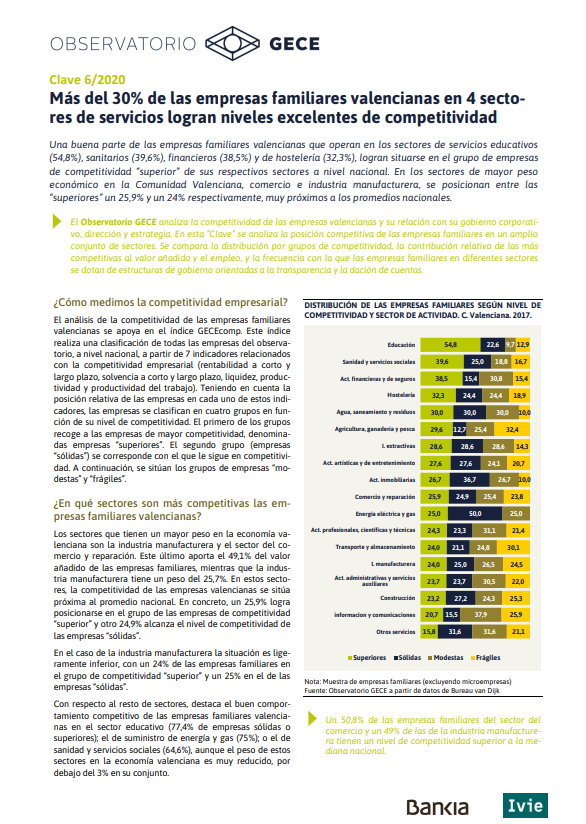
-
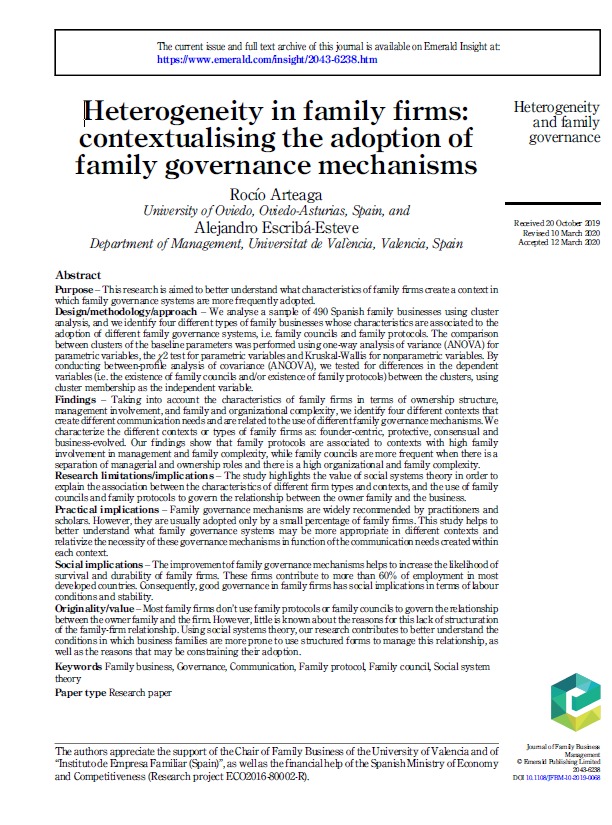
Heterogeneidad en las empresas familiares: Contextualizando la adopción de mecanismos de Gobierno Familiar.
Arteaga, Rocío; Escriba-Esteve, Alejandro
(2020). ArticleThis research is aimed to better understand what characteristics of family firms create a context in which family governance systems are more frequently adopted. Taking into account the characteristics of family firms in terms of ownership structure, management involvement, and family and organizational complexity, we identify four different contexts that create different communication needs and are related to the use of different family governance mechanisms. We characterize the different contexts or types of family firms as: founder-centric, protective, consensual, and business-evolved. Our findings show that family protocols are associated to contexts with high family involvement in...
This research is aimed to better understand what characteristics of family firms create a context in which family governance systems are more frequently adopted. Taking into account the characteristics of family firms in terms of ownership structure, management involvement, and family and organizational complexity, we identify four different contexts that create different communication needs and are related to the use of different family governance mechanisms. We characterize the different contexts or types of family firms as: founder-centric, protective, consensual, and business-evolved. Our findings show that family protocols are associated to contexts with high family involvement in management and family complexity, while family councils are more frequent when there is a separation of managerial and ownership roles and there is a high organizational and family complexity. The study highlights the value of social systems theory in order to explain the association between the characteristics of different firm types and contexts, and the use of family councils and family protocols to govern the relationship between the owner family and the business. Family governance mechanisms are widely recommended by practitioners and scholars. However, they are usually adopted only by a small percentage of family firms. This study helps to better understand what family governance systems may be more appropriate in different contexts and relativize the necessity of these governance mechanisms in function of the communication needs created within each context.
Read more Hide -

Transcurso de la Sesión 3 y 4 del Curso EF
(2020). Recurs electrònicEl viernes 21 de febrero tuvieron lugar las sesiones 3 y 4 del Curso de Empresa Familiar, tratando 'Emociones y Cultura Compartida' y 'Desarrollo de la Carrera Profesional en la Empresa Familiar' respectivamente. Los sesiones fueron impartidas por María Beltrán (Consultora FIBAC) y Juan Vicente Tamarit (Director de Alba Horneados).
-
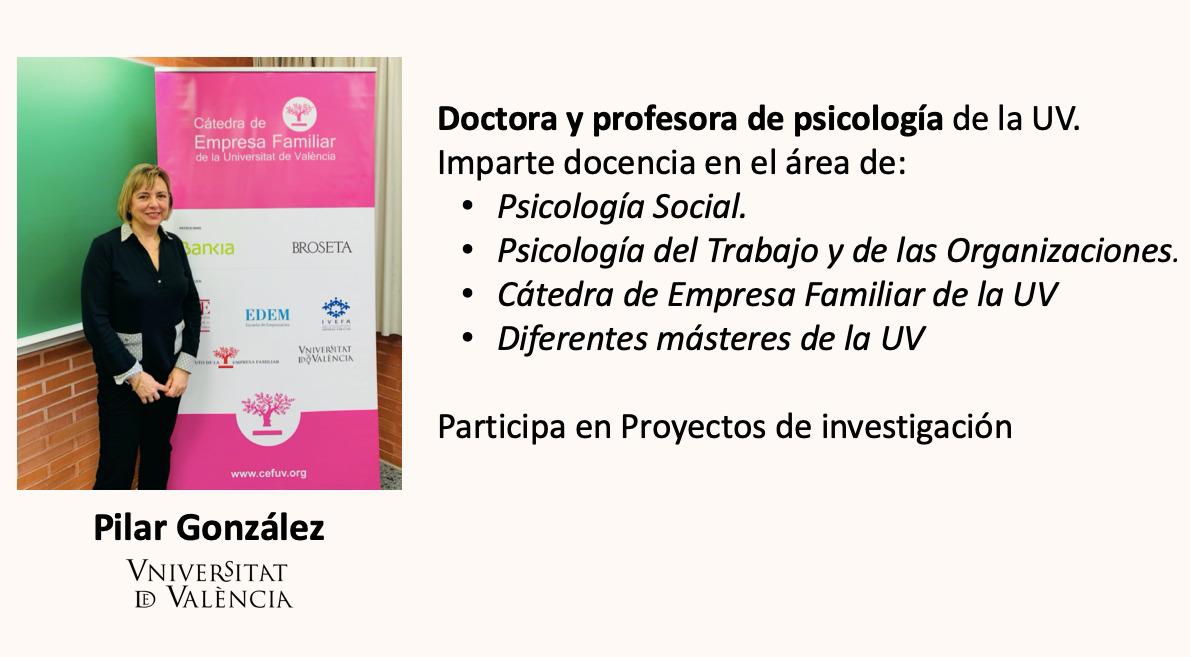
Second session of the Family Business Course (12th Edition)
(2020). Recurs electrònicOn Friday, February 14, the second session of the Family Business Course was taught by Pilar González (link to bio in the name) of the Faculty of Psychology of the UV, dealing with the “Management of conflicts in the family business”.
In this 2nd session of the course, Professor Pilar González showed students the techniques and tools to achieve a positive management of internal conflicts with the company. The session was divided into 2 blocks: Contextualization of the conflict and Negotiate and mediate.
The session began by explaining how conflicts arise, these being due to real or perceived differences between parties. The importance of the subjective factor in the origin of the conflict was stressed, without forgetting an objective basis.
In a very participatory session, Pilar had the collaboration of the students to find those factors that help us to perceive that there are conflicts (bad working environment, poor communication, delayed decisions, internal and external complaints ...) and challenged the vision Traditional conflict as a purely negative element.
In the central part of the session we had a group exercise to understand the 4 potential sources of the conflict:
- Scarce Resources
- Disagreement in procedures and Rules
- Activity and work unit
- Difference of values and perceptions
In this activity the different groups prepared and commented on some experiences (real or fictitious) in which conflicts of different origin appeared. Through the exposure of visible symptoms, students tried to find the Potential Sources of Conflict that underlie. The importance of asking all possible questions to find non-visible information and improve the analysis of the causes of the conflict was demonstrated.
Subsequently, the second block began visualizing the 5 forms of basic action in conflict situations: Collaboration, Servilism, Commitment, Competitiveness and Avoidance. It was emphasized that these forms of action are more or less optimal according to the real scenario in which we find ourselves.
The session concluded with an explanation and implementation of several negotiation tools that have proven successful. He stressed the importance of active listening and assertive language for optimal communication and communication and approach problems of the solutions that most limit a good negotiated resolution of conflicts.
Next week we will have María Beltrán (FIBAC consultant) and Juan Vicente Tamarit (director of Alba Horneados) to talk about ‘Emotions and Shared Culture’ and ‘Career development in Family Businesses’.
[Read more] [Hide] -
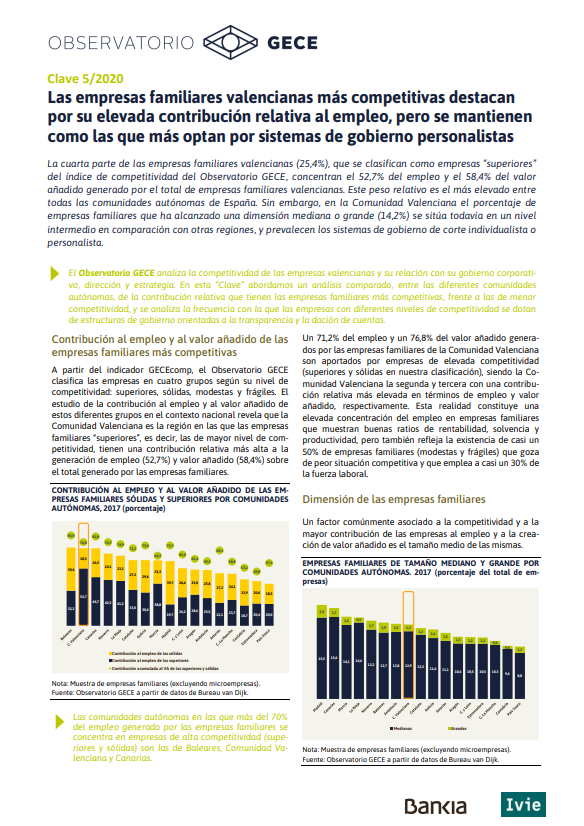
-
Foro de Empleo 2020: Claves del éxito y desarrollo profesional en la Empresa Familiar.
(2020). Recurs electrònic -
Valores en las familias empresarias: ¿Cómo se asocian al éxito y perdurabilidad de la empresa? .
(2020). Recurs electrònicLa sociedad actual demanda, cada vez con mayor firmeza, un enfoque empresarial que ponga a las personas en el centro de las organizaciones, fomentando la protección de la dignidad humana y su desarrollo pleno, con el fin de lograr una sociedad más próspera y orientada al bien común. Este desayuno tiene por objeto profundizar en las claves que ayudan a desarrollar un visión humanista de la dirección de las empresas, capaz de crear culturas organizacionales de mayor excelencia ética que sean sostenibles con el paso del tiempo. Conoceremos los casos y experiencias de dos familias empresarias con excelentes proyectos empresariales, y abordaremos la relación entre los valores éticos que tratan...
La sociedad actual demanda, cada vez con mayor firmeza, un enfoque empresarial que ponga a las personas en el centro de las organizaciones, fomentando la protección de la dignidad humana y su desarrollo pleno, con el fin de lograr una sociedad más próspera y orientada al bien común. Este desayuno tiene por objeto profundizar en las claves que ayudan a desarrollar un visión humanista de la dirección de las empresas, capaz de crear culturas organizacionales de mayor excelencia ética que sean sostenibles con el paso del tiempo. Conoceremos los casos y experiencias de dos familias empresarias con excelentes proyectos empresariales, y abordaremos la relación entre los valores éticos que tratan de trasladar a sus organizaciones, cómo los ponen en práctica en el día a día, y qué dificultades encuentran para transmitirlos, y hacer que no se desvirtúen con el paso del tiempo y la expansión de su actividad empresarial.
Read more Hide -
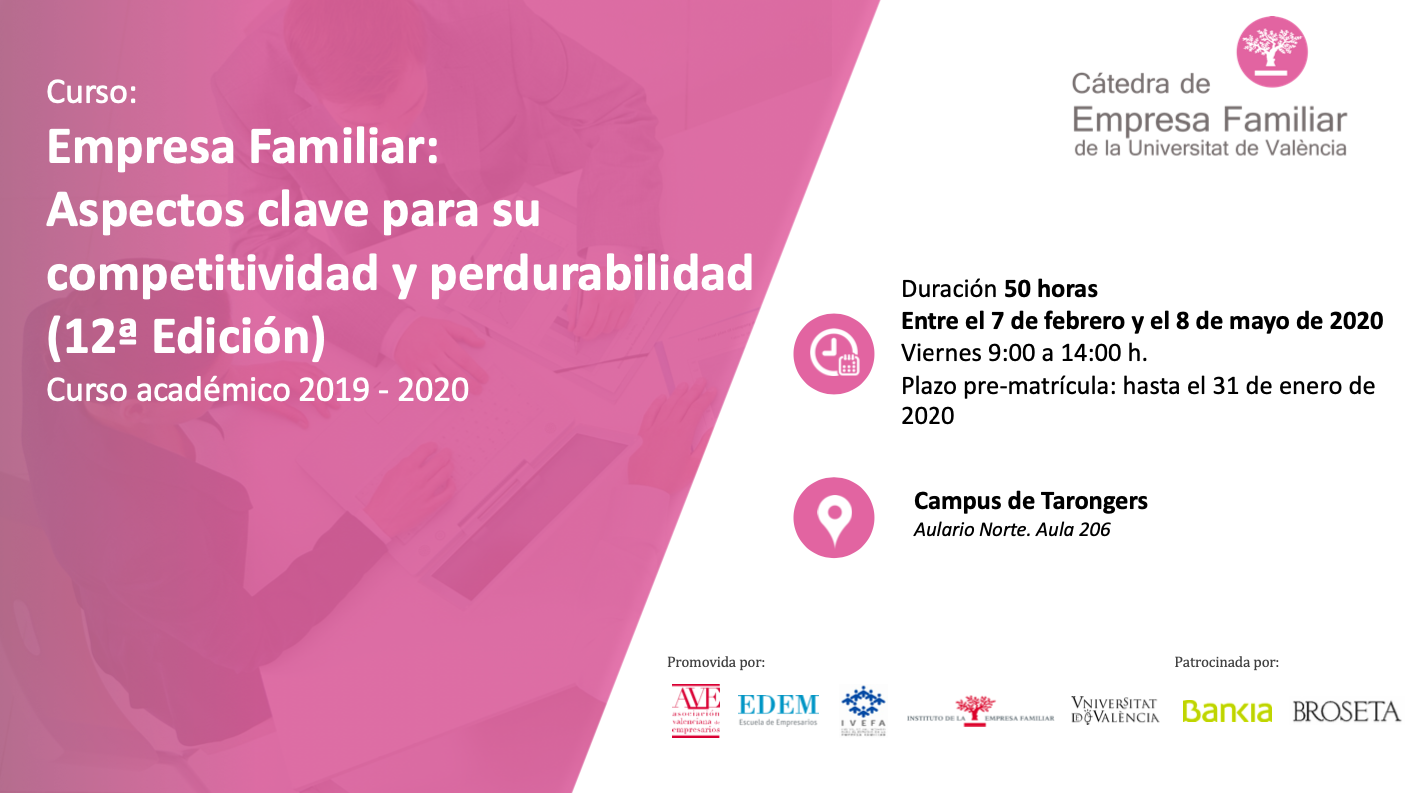
Programa del curso Empresa Familiar: Aspectos clave para su competitividad y perdurabilidad (12ª Edición).
(2019). Recurs electrònicNuestro curso de Empresa Familiar: Aspectos clave para su competitividad y perdurabilidad (12ª Edición) dará comienzo el próximo 07 de febrero con Francisco Vallejo (Consejero Delegado de Pinturas Isaval) que nos proporcionará información sobre "La familia propietaria y sus roles en la dirección y el gobierno de la empresa".
-
Cuaderno de trabajo 3/2019. La continuidad de la Empresa Familiar: Cómo vincular a las próximas generaciones
Alejandro Escribá-Esteve. UV, Director de la Cátedra de Empresa Familiar
(2019). Recurs electrònic








